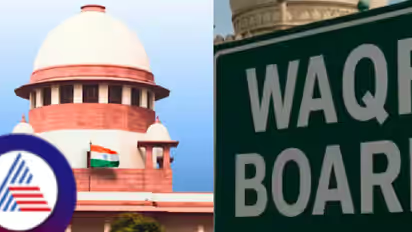Supreme Court to hear 15 pleas against Waqf Act on April 16 amid political row

Synopsis
The Supreme Court will hear 15 petitions challenging the Waqf (Amendment) Act on April 16. While the Centre defends the law as reformist, opposition parties and Muslim groups allege it violates minority rights.
The Supreme Court will hear a batch of 15 petitions on April 16 challenging the constitutional validity of the Waqf (Amendment) Act, 2025 — a controversial legislation that has triggered sharp political and religious debate across the country.
Petitioners, including civil rights groups, political figures, and Muslim organizations, argue that the amendments violate Article 26 of the Constitution, which safeguards the rights of religious denominations to manage their own affairs.
They allege the law allows excessive government interference and undermines the autonomy of Muslim religious institutions.
The Act, signed by the President on April 5, was passed by both Houses during the Budget Session, despite stiff opposition. It was cleared in the Lok Sabha with 288 votes in favor and 232 against, and later in the Rajya Sabha after a 13-hour debate with 128 in support and 95 opposed.
The government, which has filed a caveat in the Supreme Court to be heard before any orders are passed, maintains the Act is a “historic reform” that will bring transparency to Waqf property management. It has received backing from the Bharatiya Janata Party (BJP) and its allies, including JD(U), TDP, and Shiv Sena.
Union Minister Rajiv Ranjan Singh of JD(U) stressed that the law is not anti-Muslim but intended to curb misuse and increase accountability. TDP leaders echoed this, saying it will benefit underprivileged Muslims and improve clarity in Waqf administration.
However, critics including the All India Muslim Personal Law Board (AIMPLB), AIMIM chief Asaduddin Owaisi, BSP leader Mayawati, and the YSRCP have slammed the Act, calling it unconstitutional and an infringement on minority rights. They object particularly to provisions that allow the appointment of non-Muslims and women to Waqf Boards and fear it could lead to the seizure of religious properties.
Amid mounting opposition, the Bill has been referred to a Joint Parliamentary Committee for further scrutiny.
Also read: Supreme Court scraps CBI probe into Bengal SSC posts; Mamata promises support to sacked teachers
Stay updated with the Breaking News Today and Latest News from across India and around the world. Get real-time updates, in-depth analysis, and comprehensive coverage of India News, World News, Indian Defence News, Kerala News, and Karnataka News. From politics to current affairs, follow every major story as it unfolds. Get real-time updates from IMD on major cities weather forecasts, including Rain alerts, Cyclone warnings, and temperature trends. Download the Asianet News Official App from the Android Play Store and iPhone App Store for accurate and timely news updates anytime, anywhere.